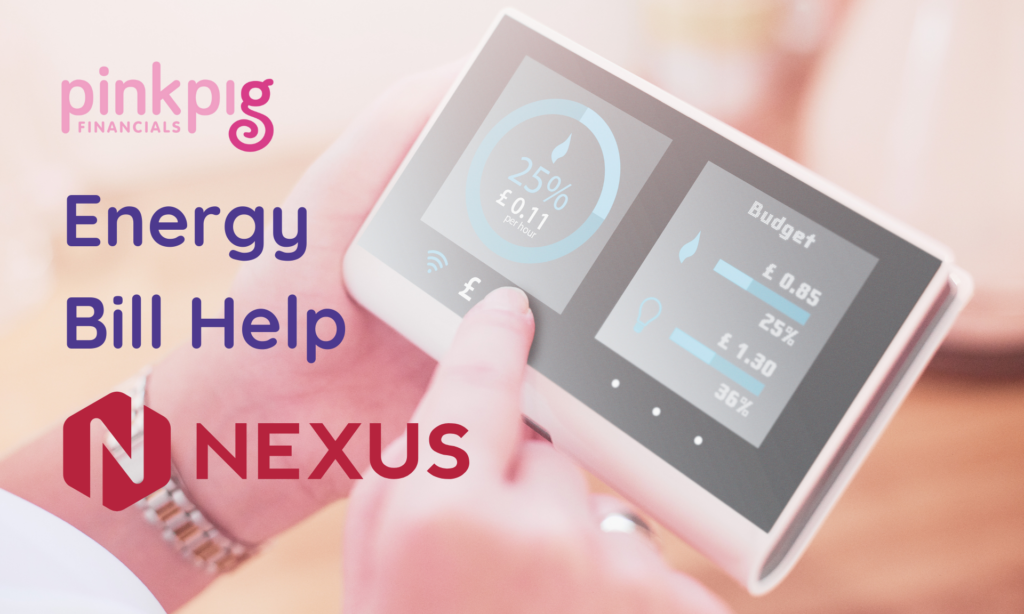There’s no escaping the headlines: a spike in energy prices is here and the ever increasing costs will be crippling for businesses.
The UK Government has announced a price cap freeze on business energy prices – at the same price per unit as households – until March 2023.
Review your energy bills
 And while this is great news, there are other things you can do to help ease the pinch. As part of our partnership with Nexus we’re able to look at opportunities for you to switch to a better energy tariff, or other ways to protect cashflow.
And while this is great news, there are other things you can do to help ease the pinch. As part of our partnership with Nexus we’re able to look at opportunities for you to switch to a better energy tariff, or other ways to protect cashflow.
If you are in the last 6 months of your contract we can review your energy bills to see if there are savings to be made.
You should also ensure that you’re paying VAT at the correct rate. For some businesses, this is 5% rather than 20%, and the difference this makes to your cash flow could be a game changer.
SEND US YOUR BILL FOR A FREE REVIEW
8 Steps to cutting costs
- Turn off all non-essential equipment when the business is closed – Even when not in use, ‘vampire’ machines and devices such as computers, printers, and copiers, continue to burn energy in ‘sleep mode’. Turn off everything you can at the end of the business day.
- Conduct an energy audit of your business – You can’t make savings if you don’t know what is using what or where the wastage is. An energy audit runs a fine-tooth comb over the business, revealing all the areas where savings can be made.
- Maintain steady heat and A/C – Don’t fiddle with the heating and A/C controls. Constant adjustment wastes energy and costs money. Set a comfortable temperature and let the thermostat do the rest.
- Switch from electric to gas for heating – Even with the cost of installation, it may work out cheaper in the long run to heat your premises with natural gas than higher priced electricity.
- Keep heating and cooling vents clear – Warm and cool air needs to circulate to be effective. Obstructing the air flow from vents with furniture or other obstacles will make your heating and A/C less efficient and consume more energy.

Constant adjustment wastes energy and costs money. Set a comfortable temperature and let the thermostat to the rest. - Cool down for less – Air conditioning is costly to use, with the typical central A/C unit consuming 3500 watts per hour when running. Other cooling methods, such as desk and ceiling fans run for a tiny fraction of this energy cost. A/C systems also need clean air flow for best efficiency. Changing filters every six months can cut 5 to 15% off your air conditioning’s energy consumption.
- Reduce hot water use – It costs money to heat water. Consider ways to lower the hot water use in your place of business. This means everything from leaky hot water taps to over-filled kettles and unnecessary vehicle cleaning.
- Switch supplier – It may not reduce your business energy consumption, but it could lower the price you pay per unit. If you can switch supplier without incurring a penalty, shop around for the best quote available.
SEND US YOUR BILL FOR A FREE REVIEW
Can we get you a lower energy bill?
Simply send us your latest energy bill (all pages), and our team at Nexus will scan the market for you. If you can get a better deal, we’ll find it. Our team will find the best tariff for your business and ensure you aren’t overpaying on VAT!
SEND US YOUR BILL FOR A FREE REVIEW
How does business energy work?
The business energy market works differently than the system for domestic users. Contract terms, unit rates, cooling off periods, and the ability to switch supplier are all affected, and they make the purchase of commercial energy significantly more challenging than buying for home use. Here are the essential points you need to know:
- Business energy is cheaper per unit, but you are locked into your contract – Business energy providers buy energy from generators and gas suppliers in bulk, using ‘futures’ purchasing to buy enough energy to last the duration of your contract. The rate you pay per unit may be fixed or variable, but bulk buying typically means businesses pay less per energy unit than home users. Unlike domestic energy supply, which can be purchased on a flexible basis, business energy is sold on contract, with terms that usually run for one to three years but can last up to five years. Term contracts mean you cannot switch supplier until you are near the end of your current contract unless you are willing to pay off the remainder of the term.
- Business energy contracts are single-fuel – Domestic users can buy ‘dual-fuel’ energy deals that combine gas and electricity supply. This option is not available for businesses, who must negotiate separate contracts for each kind of energy they require.

- Business energy deals are tailored to your business needs – Domestic users can choose from a range of published tariffs when switching supplier. Once again, this is not an option for commercial users. When a business sets up an energy contract, the provider calculates the business’s needs and offers a tailor-made quote. Because the quote is bespoke, this makes it hard to compare suppliers, as it would be necessary for the business to contact each energy company to achieve a quoted price. Using a broker to find a good energy deal is the best option here, as the business must only deal with one entity, leaving the broker to find the best tariff on their behalf.
- No cooling off period – Businesses must ensure the deal they are offered is the best for them before they agree to the contract, as there is no cooling-off period for commercial users. Cancelling a contract after it has begun can be difficult and expensive.
What are the current business electricity and gas rates?
Because businesses typically buy energy by contract and the price is tailored to their needs, current rates for gas and electricity can vary enormously. However, July 2022 figures for ‘deemed contracts’, (out-of-contract deals that usually offer the most expensive type of energy from providers), indicate business-use electricity costs at £0.17 to £0.19 per kWh, plus standing charge of £0.25 to £0.35 per day, and gas prices at £0.03 to £0.06 per kWh, (no standing charge). These rates do not include VAT, which is currently 20% for most business users.
Businesses do not qualify for the energy price-cap set by Ofgem, which only applies to home supply. This makes them particularly vulnerable to the surge in energy costs. To prevent high prices causing the collapse of many businesses this winter, the government announced an Energy Relief Bill for commercial users on 21st September. The bill provides a discount on wholesale gas and electricity prices for all non-domestic customers (including all UK businesses, the voluntary sector like charities and the public sector such as schools and hospitals) whose current gas and electricity costs have been significantly inflated by rising energy prices. This support will be equivalent to the Energy Price Guarantee put in place for households.
Key points of the business energy support plan:
- It applies to fixed contracts agreed on or after 1st April 2022, as well as to deemed, variable and flexible tariffs and contracts. It will apply to energy usage from 1st October 2022 to 31st March 2023, running for an initial 6 months period for commercial energy users.
- Savings will be first seen in October bills, which are typically received in November.
- Businesses do not need to take action to access this support. Discounts (in the form of a p/kWh discount) will automatically be applied to energy bills.
- The government has set a Supported Wholesale Price – £211 per MWh for electricity and £75 per MWh for gas, less than half the wholesale prices anticipated this winter – which is a discounted price per unit of gas and electricity
- The level of price reduction for each business will vary depending on their contract type and circumstances.
- See the full details of the support plan here.
What is the energy price cap, and does it apply to businesses?
Ofgem, (the Office of Gas and Electricity Markets), is the Government regulator for the supply of energy to UK business and domestic users. The much-publicised ‘price cap’ is the maximum price that home-users may pay per year for average gas and electric consumption. (Home users who use a lot of energy will pay more than the price cap). The cap is reviewed every six months and it may go up and down. However, it does not apply to commercial users.
Businesses do not qualify for the energy price-cap set by Ofgem, which only applies to home supply. This makes them particularly vulnerable to the surge in energy costs. To prevent high prices causing the collapse of many businesses this winter, the government announced an Energy Relief Bill for commercial users on 21st September. The bill provides a discount on wholesale gas and electricity prices for all non-domestic customers (including all UK businesses, the voluntary sector like charities and the public sector such as schools and hospitals) whose current gas and electricity costs have been significantly inflated by rising energy prices. This support will be equivalent to the Energy Price Guarantee put in place for households. See full details of the business energy support plan here.
Things to consider when comparing business energy providers
- You don’t have to buy gas and electric from the same provider – Business users must buy their gas and electric on separate contracts, there are no dual-fuel deals. If you’re seeking to switch your energy provider, always compare apple to apples, that is, gas rates against other gas rates and the same for electricity. It may work out cheaper to buy each type of energy from a different provider.
- How is the new rate being calculated? – Business energy providers will typically base their quote on the size of your business – staff, premises, your location, and the type of meter used. Ask for a breakdown of the quote, so you can see how it was achieved. There may be savings in the mix. For example, if your business is growing, more staff will use more energy. How does your staff headcount factor into the overall quote?

- Can you benefit from off-peak use? – Economy 7 contracts (also called multi-rate business energy contracts), charge a lower rate from late at night to early morning. Businesses that usually operate during these hours, or that can switch some of their activities to night-time, (for example, charging their electric delivery vehicles), could save a significant amount compared to daytime tariffs. Note that Economy 7 contracts have slightly more expensive day time rates than standard, so businesses must calculate both their day and night-time consumption to ensure an Economy 7 deal will deliver real savings.
- Where is your business based? – Energy providers have different rates for different parts of the UK. Prices reflect local energy demand, the provider’s cost of operation, and the economy of the region. Therefore, expect to pay more in London and other big cities than you would in rural areas.
- Sometimes the lowest rate isn’t the best deal – Yes, you want the cheapest rate, but you also need an energy provider with good customer service. Why? Because if there’s an emergency and you need a technician to get your power back on, that cheap provider with the poor service could end up costing you more than the savings on your tariff. Remember; it may be their energy, but it’s your reputation and business on the line if the power goes down and you can’t operate.
Business energy tariffs explained
The business energy market is complicated, with a range of different tariffs, terms, and conditions. Businesses must take care when selecting their commercial energy provider. Choosing the wrong contract could be a costly mistake. The main types of tariff are:
- Fixed Term – Most businesses choose this type of deal. There may be a range of tariffs to choose from, but they will all offer a fixed unit cost and standing charge. Your bill will vary each month depending on how much energy you use.
- Variable – Unit price and standing charge are based on market rates and can go up or down. Bills vary according to consumption and market rates and charges.
- Extended Tariff – Lets you extend your current contract with the same supplier – essentially, carry on as you were. Some providers will offer lower unit costs to customers who show loyalty by extending their contract.
- Flex Approach Tariff – You bulk-buy your energy in advance. A safe bet when prices are steadily increasing, but riskier in times of high volatility. Despite the upfront payment, this type of deal can offer large savings, as it lets you benefit from wholesale prices.
- Pass Through Tariff – A more complicated tariff that lets the customer split their bill between the energy wholesale price and other, variable costs, such as the Transmission Network Use of System (TNUoS) charges, National Grid levies and Feed-in Tariff charges that can all change up to four times a year. Essentially, you are gambling that these variable costs will go down to lower your overall bill. Not recommended for businesses that need price certainty. Additionally, Ofgem provides added contract protection for micro businesses, and there are other tariffs that apply for business energy users without a formal contract:
- Deemed Rate – If your contract expires and you do not switch supplier, or agree a new deal, you will be moved to this rolling , out-of-contract tariff. Deemed Rate contracts are one of the most expensive ways to buy business energy.
- 28 Day Rate – An obsolete rate for businesses that have not switched supplier since the UK energy market was deregulated.
- Rollover Tariff – A different kind of Deemed Rate contract – used when no alternative has been agreed before your current contract’s end date. Also one of the most expensive ways to buy business energy.
How do I switch provider?
High prices and increased volatility in the UK energy market may be here to stay, which makes it even more urgent for businesses to get the best deal they can. However, the myriad of tariffs, fees, contract terms, and providers present a vast number of variables. Getting the right deal to suit your exact business needs can be challenging.
Take the headache out of switching. Simply send us a copy of your latest bill (all pages!) and let our partners at Nexus find the best tariff for your business, and see if you can reduce the amount of VAT you pay for energy.
SEND US YOUR BILL FOR A FREE REVIEW

